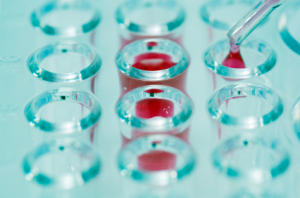ASCO: Blood test of dying cells to find cancer, mad cow disease
by
Brendon Nafziger, DOTmed News Associate Editor | June 07, 2010

A blood test, used in research,
tracks rates cell death,
or apoptosis
A blood test that scours the blood for DNA fragments shed by dying cells could help doctors check how well cancers are responding to treatment and even whether cattle are afflicted by mad cow disease.
In evidence to be shared at the American Society of Clinical Oncology's annual meeting in Chicago Monday afternoon, scientists from Chronix Biomedical found the test could classify correctly around nine out of 10 patients with breast and prostate cancer.
The test works in principle by looking for rates of cell death, or apoptosis. For breast and prostate cancers, the researchers look for "hot spots" along the genome, areas associated with the cancers. Overrepresentation of DNA fragments from these "hotspots" in the blood indicates the patient has cancer.
"It's not a genetic test," Howard B. Urnovitz, CEO and co-founder of Chronix, told DOTmed News. "It's really an apoptosis test."
For the study, the scientists compared blood samples from around 178 breast cancer and 197 prostate cancer patients with blood from around 200 healthy controls. The test picked up about 92 percent of all cancers, with a 100 percent specificity (that is, no false positives).
"From my point of view, this is very promising research," Dr. Len Lichtenfeld, deputy chief medical officer for the American Cancer Society, told DOTmed News. "There's a lot of stuff in blood. You're looking for that proverbial needle in the haystack."
About 50 billion cells in the body die each day, Urnovitz said.
For now, even if the science holds up, personal diagnoses are at least several years away. To start, the test will be marketed only toward pharmaceutical companies and cancer researchers to check whether experimental drugs shrink tumors and prevent cancer recurrence, Chronix said.
The test costs about $600 for 10 billion sequences, according to the San Jose, Calif-based company.
"Eventually, one of the product applications can be a screening program, but we're not going to do that now; that would require us to do clinical trials with FDA guidelines," Urnovitz noted.
But the test won't be limited to cancer, the researchers say. In principle, it should work for any condition in which there are differential rates of cell death.
"If you have a disease whose fundamental basis is that cells die, then this test would be effective," Urnovitz said. "We can say it works in mad cow, chronic wasting disease, breast and prostate cancer. We predict, and I could be wrong, that it will work on all cancers."
In fact in April, Chronix, along with University of Calgary, got a grant from Alberta's livestock agency to develop a way to test cattle for bovine spungiform encephalopathy, or mad cow disease. Instead of looking for cancer cells, the test works by searching for dying neurons in the region of the brain, called the obex, killed by the prions that cause mad cow disease.
"It's exactly the same test, just different markers," Urnovitz said.
Lichtenfeld said he's usually conservative in his reception of new tests, but this one seems exciting. About four years ago, he said he attended a talk in which the speaker predicted by 2016 there would be a blood test to detect 2,000 diseases. While this probably isn't that test - and likely wouldn't make the deadline - it's a step in the right direction, he said.
"It represents a whole area of research underway in many labs around the world to answer this question of finding these small, unique markers for cancer that we can effectively and routinely measure for detection or treatment," he said.
Chronix was founded in 1999.
